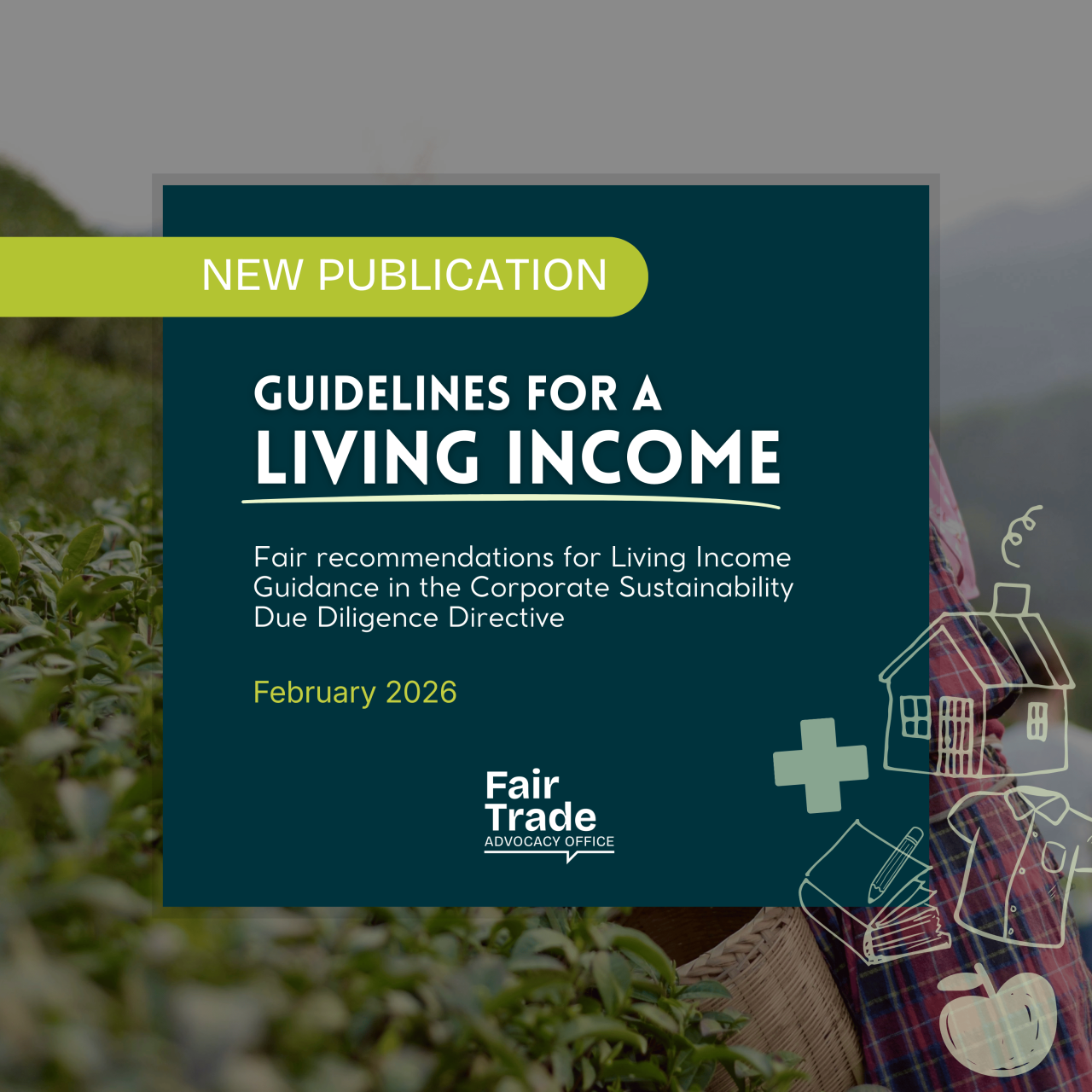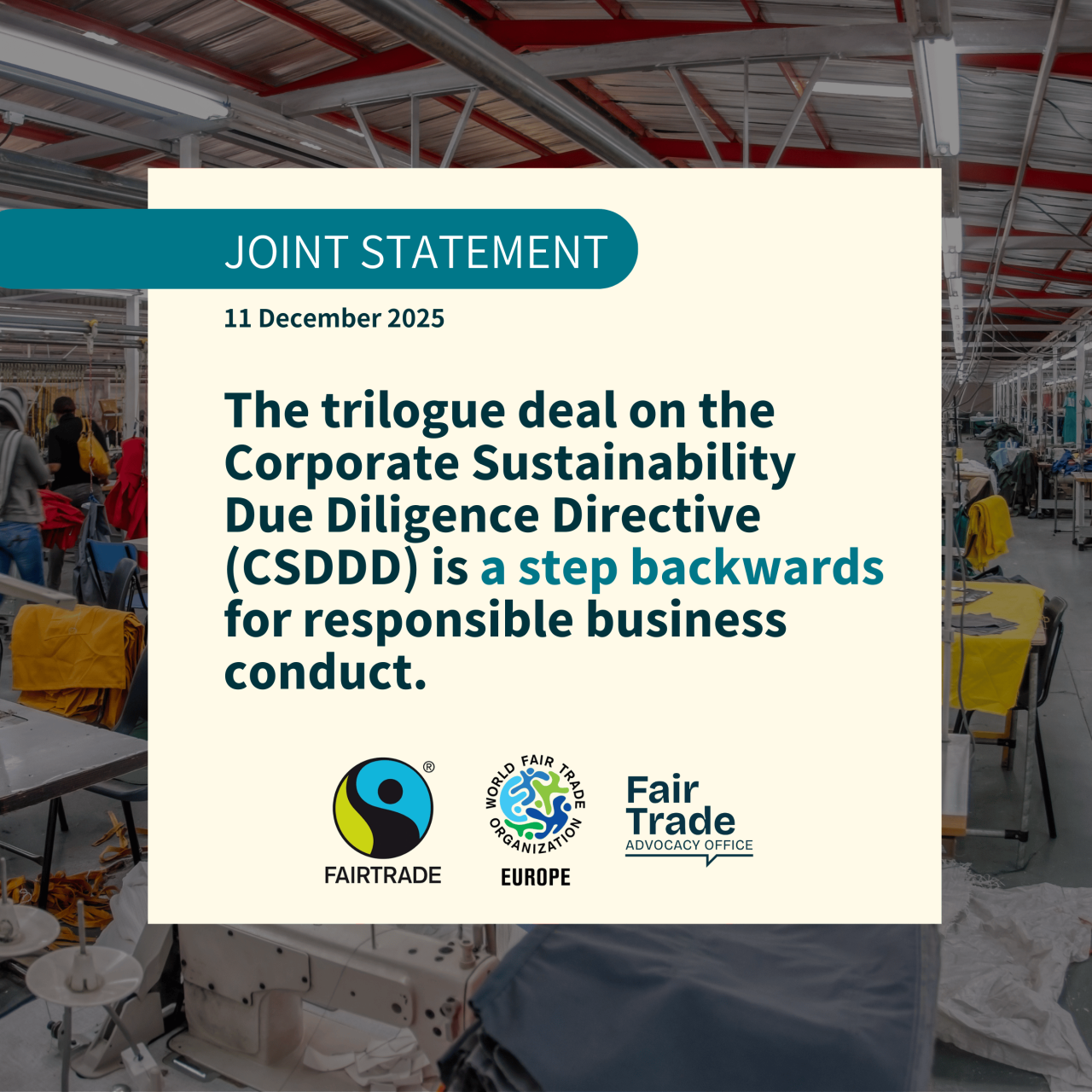Joint statement: Disastrous Omnibus proposal erodes EU’s corporate accountability commitments and slashes human rights and environmental protections

The Council and Parliament must urgently show leadership by blocking this damaging proposal, as it is jeopardising the very objectives of these laws and undermines not only the EU's commitment towards its green ambitions and protection of human rights but also its credibility as a reliable law maker.
The Omnibus proposal affects landmark laws passed under the EU’s Green Deal, including the Corporate Sustainability Due Diligence Directive (CSDDD), the Corporate Sustainability Reporting Directive (CSRD), and the Taxonomy Regulation. These laws mandate responsible business practices, introduce accountability for corporations abusing human rights and damaging the environment, and provide access to justice for survivors. They also aim to improve transparency on sustainability reporting and help guide sustainable investment. These are all essential to the EU meeting its goal of being the first climate-neutral continent by 2050.
When President Ursula von der Leyen announced late last year an Omnibus proposal to simplify reporting and sustainability requirements for companies, she committed to upholding in full the spirit and “content of the law,” and stated that the goal of the exercise was to reduce overlapping obligations. The proposal published on 26 February represents a stark departure from this promise and, if implemented, will wipe-out the core purpose of these laws.
The Omnibus proposal would axe many of the CSDDD’s key provisions, making it virtually toothless. It would also delay by one year the transposition of the Directive by the EU Member States.
If implemented, in practice this could result in:
- Civil liability will to a much larger extent be left to EU Member States’ discretion, with the potential of drastically reducing access to justice for victims in front of EU courts. Representative actions are removed, meaning that Non-Governmental Organisations, trade unions, and human rights institutions might be unable to represent victims in court. Lastly, removing the overriding mandatory provision might lead EU courts to apply the laws of the country where the harm occurred instead of national law, which could potentially undermine the overall effectiveness of the civil liability provision.
- Companies will only be required to assess harms attributable to direct business partners, which reduces drastically the value chain. It is further stated that, if the company has "plausible information" of impacts by indirect partners, it should address them, however such a concept heavily relies on interpretation.
- There is no longer an obligation to "put [...] into effect" Climate Transition Plans, which would introduce a dangerous loophole, allowing companies to comply with the provision, in theory, by simply producing a plan on paper, rather than putting it into action.
- EU Member States would no longer be able to establish more ambitious rules than the directive when it comes to the identification, prevention and mitigation of human rights and environmental impacts and the establishment of a grievance and notification mechanism.
- Companies will no longer have to terminate contracts (even in cases where it is possible or likely that abuses continue).
- Stakeholder engagement will be reduced to those "directly" affected, meaning that consumers groups, national Human Rights Institutions and Non-Governmental Organisations and human rights defenders are excluded from such definition. Also, consultation with "relevant" stakeholders is no longer required for disengagement from business operations or monitoring.
- The frequency of monitoring the effectiveness of due diligence measures is reduced from every year to every 5 years, or whenever "measures are no longer adequate or effective." This provision risks making the due diligence exercise largely ineffective.
- Removal of the minimum cap on sanctions of 5% of the turnover, which may lead to lower and symbolic sanctions and trigger a race to the bottom among Member States.
- The Commission is no longer obliged to examine the necessity to apply due diligence rules to financial services & investment activities in a future review of the law.
Additionally, the Omnibus proposal envisions substantive changes to the CSRD, which has already been transposed by most of the EU Member States. Consequently, the proposal to postpone the CSRD application by two years for certain businesses (2nd and 3rd wave) creates uncertainty for those that have already started preparing for implementation. Moreover, the Commission proposes to drastically reduce the scope, excluding roughly 80% of companies from sustainability reporting obligations without providing companies with a proportionate standard. This will significantly reduce the availability and reliability of sustainability data. Lastly, it is concerning how the Commission proposes to limit the data requests by very large companies towards their large to mid-sized suppliers.
Sustainability and corporate accountability are essential for European countries to move towards an economy that works for people and the planet, as well as for attracting long-term and sustainable investments. These laws have the potential to promote more resilient supply chains, provide legal clarity and stability for all stakeholders. It is shortsighted to remove the engine from the vehicle that can help companies deliver on their existing human rights responsibilities.
Over the last decade, the EU has introduced a range of reporting obligations. Should there be a need for more cohesion, planning and guidance on how to implement these obligations, it should be achieved through mapping existing and upcoming obligations, issuing interpretive and implementing guidelines and reviewing efficacy of these laws as envisioned by the existing review clauses. Creating more confusion, uncertainty and costs by changing the text of these laws is not the answer.
We therefore urge the Council of the EU and the European Parliament, as a matter of urgency, to ensure that in the upcoming legislative negotiations, the Omnibus proposal is revised to ensure that any amendments seeking to weaken the CSDDD are rejected. Any discussion of the CSDDD should be strictly limited to interpretative measures such as guidance and delegated acts and the text of the law itself should not be subject to any revisions. Regarding the CSRD, the European Parliament and Council should lower the thresholds of in-scope companies and give mid-sized companies a proportionate standard. The limitations on data requests should be reworked.
The world is watching Europe for guidance and stability. The EU has an opportunity to remain steadfast in its green ambitions and human rights commitments by protecting these essential sustainability laws and recognizing that promoting sustainable business practices will ultimately foster a more stable environment that will give the EU an edge now and in the long run.
Background:
The Omnibus proposal was released following a rushed and opaque process. In early February, the Commission hosted a two-day closed-doors round-table with a handpicked, small group of stakeholders. In the consultation, company representatives far outnumbered trade unions and NGOs present. This short timeline combined with an inter-services consultation that lasted a mere 24 hours over the weekend are out of step with the Commission’s own Better Regulation Guidelines. The Omnibus proposal is released amidst countless stakeholders publicly voicing concerns about its potential impact. In January already, 170 organisations representing members of civil society, human rights and environmental defenders, trade unions and climate activists, jointly decried the planned Omnibus. Many more prominent voices from a wide variety of sectors also publicly opposed the proposal evidenced by the blizzard of public statements and letters sent to the European Commission in the last weeks: from civil society organisations in Europe and in the Global South, trade unions, large companies and business associations, responsible investors, economists and researchers, legal and sustainability practitioners, and the UN Business and Human Rights Working Group.
You can view the full list of signatories here.
More From The Workstream

Guidelines for a Living Income: Fair recommendations for Living Income Guidance in the Corporate Sustainability Due Diligence Directive

Trilogue deal on CSDDD is a step backwards for responsible business conduct

JOINT STATEMENT: Call for European Parliament to deliver a credible and ambitious approach on Omnibus I
